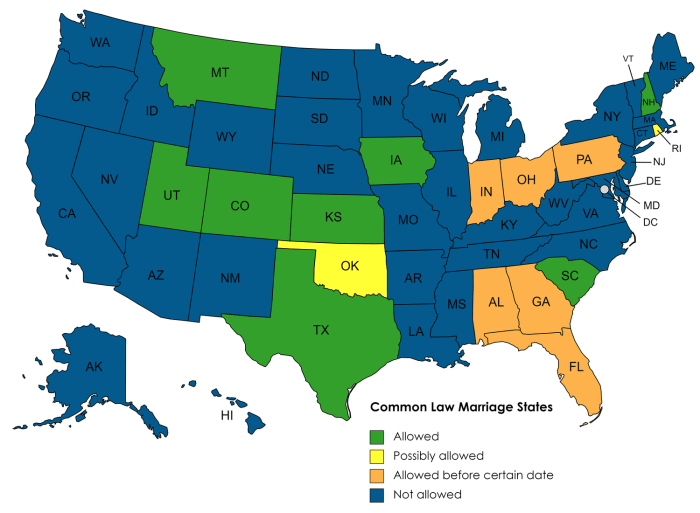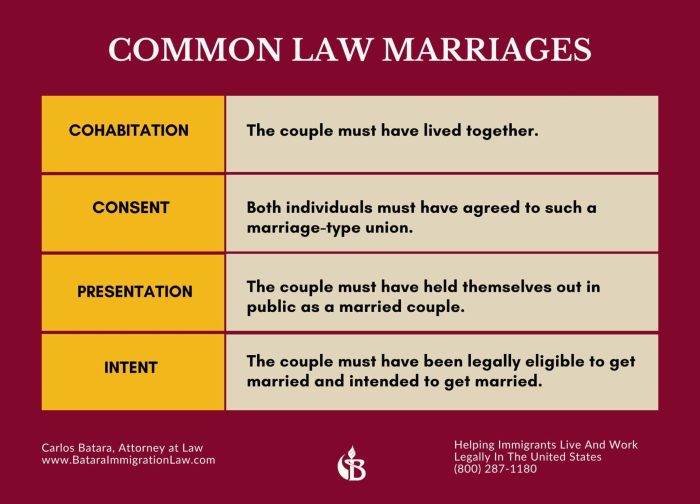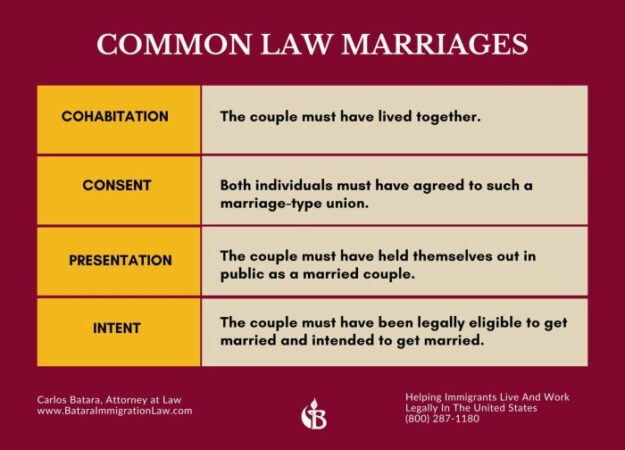
Is California a common law marriage state? This question often arises, especially for couples who have been together for a long time without a formal marriage certificate. While many states recognize common law marriages, California is not one of them. California law does not allow for couples to establish a legally recognized marriage solely based on their actions and representations. This means that even if a couple lives together, presents themselves as married, and intends to be married, they are not legally recognized as spouses in California.
The history of common law marriage in the United States dates back to colonial times when formal marriage ceremonies were not always readily available. Over time, many states have abolished common law marriage, often citing the need for greater clarity and consistency in family law. California’s stance against common law marriage reflects this trend towards formalization and standardization in marital relationships.
Introduction to Common Law Marriage

Common law marriage, also known as informal marriage or unregistered marriage, is a legal relationship where a couple is recognized as married without a formal ceremony or license. This recognition arises from their behavior and intention to be married, often established through a public declaration of their marital status, cohabitation, and presenting themselves as a married couple to the community.
The concept of common law marriage originated in English common law, dating back to the 12th century. At that time, formal marriage ceremonies were not required, and couples were considered married if they lived together, held themselves out as married, and intended to be married. This practice continued in many English colonies, including those that became part of the United States.
States That Recognize Common Law Marriage
While common law marriage was widely recognized in the United States during its early history, it is no longer permitted in many states. Currently, only a handful of states and the District of Columbia recognize common law marriage, with specific requirements for establishing the relationship.
Here is a list of states that currently recognize common law marriage:
- Colorado
- Iowa
- Kansas
- Montana
- New Hampshire (for inheritance purposes only)
- Oklahoma
- Rhode Island
- South Carolina
- Texas
- Utah
- District of Columbia
It’s important to note that even in states where common law marriage is recognized, specific requirements and procedures must be met. These requirements typically include:
- Present themselves to the public as married: The couple must hold themselves out to the community as being married, such as using the same last name, referring to each other as husband and wife, and attending social events as a married couple.
- Intend to be married: The couple must have the genuine intention to be married, not just living together as a convenience. This intention is usually demonstrated by their actions and statements.
- Cohabitation: The couple must live together as husband and wife. This means they share a residence and present themselves as a married couple to the community.
Each state that recognizes common law marriage has its own specific requirements and procedures. It is crucial to consult with a qualified attorney in the relevant state to ensure compliance with all applicable laws and regulations.
California’s Position on Common Law Marriage

California does not recognize common law marriage. This means that couples who live together and present themselves as married, even if they have not obtained a formal marriage license and certificate, are not legally considered married in California.
Legal Precedent Regarding Common Law Marriage in California
California has consistently rejected the concept of common law marriage, primarily based on the belief that it could lead to fraudulent claims of marriage and complicate inheritance and property division issues.
“The California Supreme Court has consistently held that common law marriage is not recognized in this state.” – In re Estate of Fidelity (1952) 111 Cal. App. 2d 375, 377.
Comparison with Other States
While California does not recognize common law marriage, several other states do. These states often have specific requirements that couples must meet to establish a valid common law marriage, such as holding themselves out as married, intending to be married, and living together as husband and wife.
- States that recognize common law marriage include: Colorado, Iowa, Kansas, Montana, New Hampshire (for inheritance purposes only), Oklahoma, Rhode Island, South Carolina, Texas, Utah, and the District of Columbia.
- It is crucial to note that even in states that recognize common law marriage, the requirements and legal implications can vary significantly.
Requirements for Establishing a Common Law Marriage: Is California A Common Law Marriage State
While California does not recognize common law marriages, it’s important to understand the elements that would typically be required to establish such a relationship in other states. This knowledge can be helpful for understanding legal implications when dealing with relationships that may have been considered common law marriages in other jurisdictions.
Essential Elements of a Common Law Marriage
To be legally recognized as a common law marriage, a couple must typically meet certain requirements. These requirements vary from state to state, but generally include the following:
- Present Intent to Marry: The couple must have a clear and present intention to be married, not just living together as a couple.
- Holding Themselves Out as Married: The couple must publicly represent themselves as married, such as using the same last name, filing taxes jointly, or introducing each other as husband and wife.
- Cohabitation: The couple must live together as husband and wife.
Consequences of Failing to Meet the Requirements
If a couple fails to meet all the requirements for establishing a common law marriage, they may face legal consequences. For example, they may not be recognized as a married couple for purposes of:
- Inheritance: The surviving partner may not be entitled to inherit property from the deceased partner.
- Spousal Benefits: The partner may not be eligible for spousal benefits such as Social Security or health insurance.
- Divorce: The couple cannot legally divorce, as they were never legally married in the first place.
Legal Recognition and Implications
In California, while common law marriage is not recognized, individuals who have held themselves out as married and meet certain requirements may be considered legally married for specific purposes, such as property division and inheritance. Understanding these implications is crucial for individuals involved in such relationships.
Property Division in Common Law Marriage Cases, Is california a common law marriage state
California courts treat property division in common law marriage cases similar to traditional marriages. This means that the court will divide community property, which is any property acquired during the relationship, equally between the parties. Separate property, which is any property acquired before the relationship or received as a gift or inheritance, is not subject to division.
For example, if a couple living together as husband and wife acquire a house during their relationship, the house will be considered community property and divided equally upon separation. However, if one partner owned a car before the relationship, the car will remain their separate property and will not be subject to division.
Inheritance Rights in Common Law Marriage Cases
While California does not recognize common law marriage, individuals who have held themselves out as married and meet certain requirements may be considered legally married for inheritance purposes. This means that the surviving partner may be entitled to inherit from the deceased partner’s estate as if they were legally married.
For example, if a couple living together as husband and wife for many years, have held themselves out as married to the community, and one partner dies without a will, the surviving partner may be entitled to inherit the deceased partner’s property under California’s intestacy laws.
Real-World Scenarios
Here are some real-world scenarios involving common law marriage in California:
- A couple has been living together for 10 years, holding themselves out as married, and have joint bank accounts and credit cards. When they separate, one partner claims they were never married and refuses to divide the assets. The court may find that they were in a common law marriage and order a division of property based on their relationship.
- A couple has been living together for 5 years, holding themselves out as married, and have a child together. One partner dies without a will. The surviving partner may be able to claim inheritance rights as if they were legally married.
Termination of a Common Law Marriage

In California, ending a common law marriage involves a legal process similar to dissolving a traditional marriage. While California doesn’t recognize common law marriages, if a couple has established a valid common law marriage in another state and moves to California, their relationship will be treated as a valid common law marriage.
Legal Grounds for Termination
To end a common law marriage in California, the couple must file for dissolution, which is a legal process similar to a divorce. The grounds for dissolution in California include:
- Irreconcilable differences
- Adultery
- Desertion
- Extreme cruelty
- Habitual intemperance
- Insanity
Legal Consequences of Terminating a Common Law Marriage
The legal consequences of terminating a common law marriage are similar to those of ending a traditional marriage. These include:
- Division of marital property
- Spousal support (alimony)
- Child custody and support
The division of marital property will be determined based on California’s community property laws, which generally divide assets acquired during the marriage equally between the spouses. Spousal support may be awarded to one spouse if they are unable to support themselves financially after the dissolution. Child custody and support will be determined based on the best interests of the child.
End of Discussion
While California does not recognize common law marriages, it’s important to understand the implications of this stance. Couples who believe they are in a common law marriage may face legal challenges regarding property division, inheritance, and other marital rights. If you are considering a long-term relationship in California, it is highly recommended to formalize your commitment through a traditional marriage ceremony to ensure legal protection and clarity.
FAQ Summary
Can I get a divorce if I’m in a common law marriage in California?
Since California doesn’t recognize common law marriage, you cannot get a divorce in the traditional sense. However, you may be able to file a lawsuit to determine property rights and other legal issues related to your relationship.
What happens to property if a couple lives together for a long time in California but isn’t married?
California courts will typically apply the principles of “community property” to determine how property is divided in a long-term relationship, even if the couple is not married. This means that property acquired during the relationship is generally split equally between the partners.
Can I get spousal support if I’m in a common law marriage in California?
Spousal support is generally only available to legally married couples. Since California doesn’t recognize common law marriage, you would not be eligible for spousal support.





